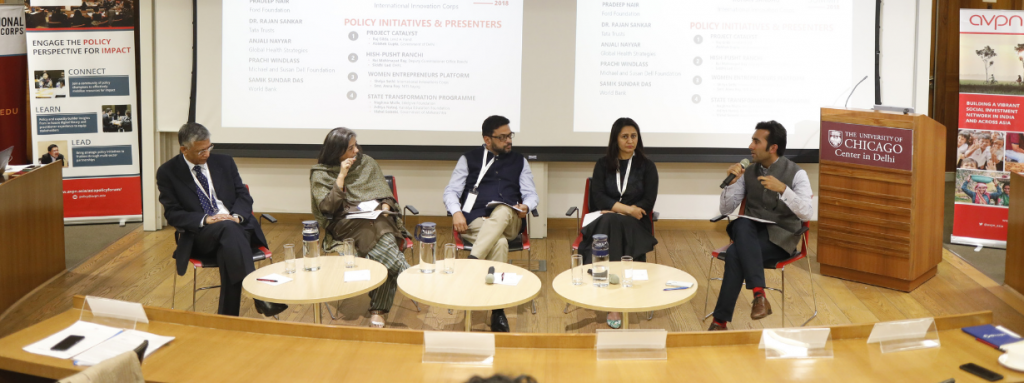4 min read
“Data can cut through the noise around information and place facts in the hands of champions of change.”
Dr.Shamika Ravi, Director of Research, Brookings India
The importance of data for policy making, interventions and impact assessment gained impetus at the AVPN India Policy Forum (IPF) 2018. With different layers of data being produced in India through national surveys, administrative and cell-phone data, there is immense scope to not only measure policy outcomes but also evaluate existing policies and identify gaps. Such an approach will help reduce the time frame that is normally required to implement, assess and amend a policy.
Hosted in New Delhi, on 5 December, the IPF sought to understand the use-case for real data in education, skills & livelihoods and nutrition outcomes and guide policymakers to use data for better policy implementation. With more than 92 delegates across India, the event provided a platform to empower the community on two fronts: (1) explore strategies to support state and district-level policymakers in making data-driven decisions; (2) identify ways to develop the data infrastructure on a national level.
Data can catalyse champions of change
While the role of data in the decision-making process was recognised way back in 2012 or before, this approach has picked up speed in recent time. In India, evidence-based policymaking through data gained prominence due to the efforts of National Institute for Transforming India better known as NITI Aayog, a government public policy think-tank. NITI Aayog started using real-time district level data for its Aspirational District Programme. “Real-time data encourages policymakers to be responsive, which translates into good administration and effective governance”, says Mr.Amitabh Kant, CEO of NITI Aayog. Underdeveloped districts are ranked across key social indicators in real-time and reported on the champions of change dashboard. This form of data is used in Dhenkanal district in the state of Odisha to reduce maternal and infant deaths and improve the child sex ratio by 30 percent. Citing such examples of leveraging data to make social impact, Mr.Kant urged the social investment community to support the government in its endeavour to build a robust data regime in the country and establish a partnership in improving the key human development indicators.
Capacity building is fundamental to data management
In order to drive evidenced-based change, there is a need to build the capacity of policy stakeholders who deal with field-level data on a day to day basis. These policy-stakeholders collect primary data from the community but lack basic knowledge on what constitutes as accurate data. This was reiterated by Mr.Rai Mahimapat Ray, the District Magistrate and Deputy Commissioner of Ranchi district, who highlighted the need to develop the skills of Anganwadi workers, Auxiliary Nurse Midwife Workers and ASHA workers (AAA workers); all of whom are frontline workers in implementing the early childhood care and maternal policies in India and also critical players in collecting data relating to nutrition. An initiative of a similar kind was carried out through a collaborative effort amongst Kaivalya Education Foundation, Edelgive Foundation and the government of Maharashtra. The partnership provided coaching workshops and supported cluster and block level officers in using data for decision-making process.
Cross-sector participation is needed to build a resilient data infrastructure
Being a diverse country with multiple level of governance, India has a large volume of data flowing in and out of the system. Private players can lend their expertise in supporting the Aspirational Districts programme by enhancing the capacity of stakeholders in data management and collection, and working with government officials in districts to identify gaps in policy implementation. On the other hand, academic institutions like Brookings India can essay the role of third-party evaluators by evaluating the data collected to ensure unbiased results. Voluntary organisations are also critical stakeholders in complementing the work of policy stakeholders in data collection. With the government’s willingness to partner with multi-sector organisations, the policy landscape reflects an earnestness to effect change. The ball is now in the social investors’ court to take up these actionable opportunities and collaborate on policy initiatives.
To further such ongoing partnership efforts, AVPN launched APFx to inspire delegates to collaborate across sectors and identify various policy initiatives in need of different types of resources. Using this platform, policymakers can feature actionable policy initiatives that are ready for cross-sector engagement from the wider AVPN membership. APF invites foundations, NGOs and the policy sector to list their public-private initiatives on APFx.
Mapping out the road ahead
Data collection and assessment are difficult endeavours, but for a subcontinent like India with 543 parliamentary constituencies, these will be mammoth tasks. Nonetheless, there is scope for strategic collaboration between policy stakeholders and the social investment community to bring about a systemic change. AVPN seeks to help each player identify their strengths and align their vision to achieve a common goal. In turn, we hope that this will foster lasting relationships between the social investment community, civil society organisations and policymakers, thereby catalysing positive and transformative outcomes.
View more India Policy Forum resources on the Recap page.


















